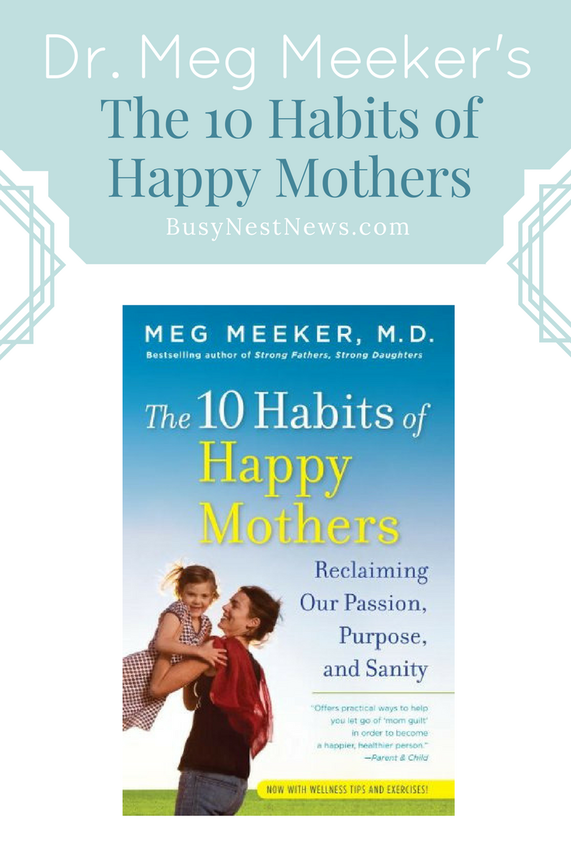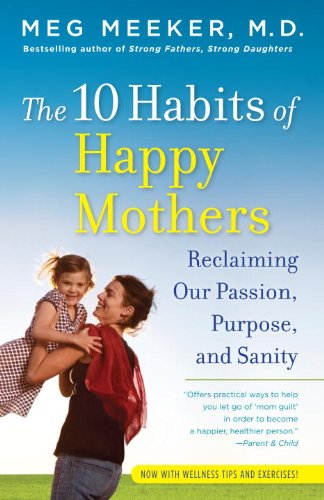|
By Brianna This post contains affiliate links. If you buy the product using our links, you're helping to keep Busy Nest News running. Thanks! The 10 Habits of Happy Mothers: Reclaiming Our Passion, Purpose, and Sanity, By Meg Meeker, M.D.Summary: In The 10 Habits of Happy Mothers, Dr. Meg Meeker employs her wisdom as a mother and successful pediatrician to help women who are struggling to be happy in the midst of motherhood. She focuses on friendship, simplicity, love, value, faith, solitude, money, fear, hope, and purpose as the key issues that happy mothers have addressed in their lives, and provides examples of real mothers doing just that. Review: The last few years I have surprised myself by becoming a bit of a self-help book junkie. I just love reading research that’s been synthesized into a theme, and hearing the secrets and just-starting-out stories of the successful in every arena. I’ve noticed that a mainstay of this genre are the many books with a spiritual slant. Written by thinkers from within Christianity and Judaism most often, the authors in this subset do not shy away from showing us how their religious beliefs influence their methodologies, or the advice they ultimately offer. For the most part, I don’t mind this practice. The authors are still passionate scholars in their fields, and if ancient texts can back up sound advice, that’s nice, too. The Five Love Languages and Boundaries both fall into this group, and both are very valuable resources, with valuable insights and lenses through which we can look at our relationships. Having heard Dr. Meg Meeker on the radio and read the descriptions of her books, I expected The 10 Habits of Happy Mothers to fall into this group. Unfortunately, I don’t think that it does. Before I dig into the content, there’s something I need to explain that might taint my perception of this book. Whenever we do these parenting book reviews, I try to get the audiobook, rather than the print. For The 10 Habits of Happy Mothers, the publishers employed a world-class reader in Karen White. But I think White was an awful fit for this book. Her reading was solid, for sure, but her tone was so condescending and patronizing, that I was ripping the earbuds off my ears by the end of the introduction. I’m sure she (and the person who selected her for this) was going for maternal and encouraging, but for me (and other listeners who reviewed the book on Audible) her tone was infuriating. So I took a breath, increased the speed of the reading to 1.2x to mitigate the tone, and did my best to separate Dr. Meeker’s words from Karen White’s voice. It was work. Once I was over the surprising disappointment that was the recording, my rating for the book improved. That is to say, it went from being a one-egg book to two-egg book. If you love having simple concepts analyzed and illustrated into oblivion, coupled with constant reminders about God’s love for us all, then this is a five-egg book for you. From a completely literary standpoint, I found her anecdotes often went on so long, that I can’t even remember which points they were meant to illustrate (although the shorter ones were more poignant, as well as more effective). I found the habits themselves to be fairly obvious things most moms wish they could prioritize, but don’t know how. She talks about the importance of keeping close girlfriends, taking time for yourself, and other such self-care measures. But she also tells us that when your kids are little, or you’re a single mom, you’ll just have to put these things on hold for a while, as in years. What? The women picking up this book want you to throw them a line, and you just told them that “me time” will just have to wait half a decade? Not what I was expecting. Furthermore, Dr. Meeker makes some assumptions that made me want to throw the book (read: my phone containing the audiobook) against the wall. One is this idea that all mothers want to make their kids their world, and do and buy everything for them. My kid is an additional family member whom I love, and it is my job to raise her into a successful adult, not to buy her everything the other kids have or sign her up for dozens of classes. And if I hear automatically falling in love with new babies the moment we see them being treated as a given one more time, I might scream. I love my Monkey very much, but when she was first born, I didn’t know her! I wasn’t sure I liked her right away, and I certainly didn’t feel anything rising above survival until she was sleeping well and gaining weight. Dr. Meeker’s assumptions made me feel alienated. Frankly, I don’t think I’m the mother this book was aiming for. The mother this book is for has insecurities that align in the exact opposite ways as my own. Bottom Line: Between the patronizing tone (of both the reader and the author) and the long-winded explanations for each habit, this book really took too much mental energy to get through. To me, The 10 Habits of Happy Mothers is worth two eggs, and I would not recommend it to anyone self-aware enough to already be reading parenting books and articles. Discussion: Brianna: What do you think, Ariel? Am I being too harsh? Did my awful recording make the experience worse than it was in print? Ariel: To be frank, at this point in time I am not sure I am going to make it to the end. (Edit: I made it!) While I do find myself underlining some points. This book could have been summed up as a tidy little listicle “10 Habits To Regain Your Sanity, Moms!” I would have clicked on that. It would have taken a whole 10 minutes out of my day to read. I would have walked away feeling slightly empowered without having to make any real life changes. But isn’t that the whole purpose of the inspiring listicles? Click bait. So I would agree. It’s a two egg book. I would not read it again. I barely got through it the first time. With that being said though, I did come away with some good quotes and concepts I might not otherwise have stopped to think about. It wasn’t all bad. In her chapter “Making time for solitude” which probably should be retitled “No duh moms need down time” she makes a good point. She believes that too much stimulation, especially negative stimulation, but even positive stimulation desentitizes us. She writes, “Retreating from too much stimulation, even positive stimulation, is necessary for a healthy sensitivity.” Do you agree? Brianna: I definitely agree that it wasn’t entirely devoid of insight, and the bit about truly finding solitude is profound in its simplicity. I also really enjoyed reading the examples of loving your children in the way they need it. The example that sticks in my mind was very extreme, but shows that there is something to a mother’s intuition when it comes to loving your children the way you think best, regardless of what others around you say. All other points were good, but could have ended after the introduction to their respective chapters. It would have made the book so much shorter, but I would not have begrudged reading that! Having heard Dr. Meeker on the radio and in podcasts, and hearing people sing her praises for years, I was really looking forward to this book. She sounds like such a fun, lively, down-to-earth lady. This book disappointed me. Did you have any expectations when you started this book? Ariel: As harsh as it sounds, I was expecting it to be useful. With a title as catchy as The 10 Habits of Happy Mothers, I was hoping to come away with my next big personal project. This book was supposed to focus my upcoming New Year’s resolutions. But alas, none of these concepts were groundbreaking. But to be fair to Dr. Meeker, the ideas might have been novel seven years ago when the book was published. The problem is that the concept of self-care has been hyped to such an extent that we know already. Asking any random mother off the street, chances are she could name several of these habits as ways to find more joy and contentment in her daily life. We know what they are! I was hoping for help with implementation. And not the vague tips that Dr. Meeker gives at the end of each chapter but actionable steps to put in place now. What do you think Brianna, was this book one big “no, duh!”? Brianna: I agree with what you said about this stuff being obvious, now that we’ve had a few years of self-care smacking us upside the head in every medium imaginable. I guess I was frustrated by how much overlap there was between these supposedly discrete concepts. For example, Say No to Competition and Create a Healthier Relationship with Money, both had a pretty big thread in common. That thread being that some parents feel the best way to parent is by giving their kids every toy, class, or clothing item their little hearts could desire. The answer to both could be summed up with “Stop throwing money at the problem and overscheduling your kids to prove you’re uber parents.” Just, over all, I felt like each chapter started with a pretty good point, but the explanations belabored the topics overmuch. Especially since I’m used to seeing listicles with very similar points, in a format I can digest in five minutes. I would recommend this book to some poor mother who has not been reading such listicles and needs a push in the direction of self-care. But anyone who comes to this book already excited about self-care and looking for concrete action points (like Ariel and I did) will be sorely disappointed. There just isn’t more to say.
0 Comments
Leave a Reply. |
AuthorsAriel and Brianna are friends who met while working in a library. Now they collaborate to develop life-enhancing book club experiences. Archives
June 2023
Let's keep in touch!Categories
All
|







 RSS Feed
RSS Feed